It’s been a month since Essen and I thought it might be fun to quickly write about what things look like now that the dust has settled and some of the hype has normalised. While SPIEL is going on, everybody – me included – is of course excited about all the new releases and getting your hands on games that soon will be sold out. This year, I bought more games than I normally would – mostly with the intent of reviewing the – but even so way less than most of the big YouTubers. So this is also meant as a counterpoint to once again highlight: you don’t necessarily need to be there or get a lot of games to get most of the fun.
Let’s Recap
Here is a shot of all the games I picked up at Essen. From back to front: the quick deck building mini-civ game Altay, Vladimir Suchy’s new release Resafa, the new heavy weight from Dani Garcia called Daitoshi, probably the most talked about game of the fair SETI, card drafting game AI 100% Human, the beautifully illustrated Kintsugi, three copies of Tranquility the Ascent as gifts for friends, the Sky Team expansion, the long awaited Flamme Rouge Grand Tour, the tiny Gloomhaven Button & Bugs, the very limited Roads & Boats Scenario Book 1, a Dice Tower promo for Caper Europe, Oink Game’s Souvenirs from Venice, solo-only legacy card game Kingdom Legacy (not in picture), word-clue-giving game Landmarks (not in picture) and finally the Tea Garden promo (more on that later). That’s a lot of games, about 550€ in games if my bookkeeping is accurate.
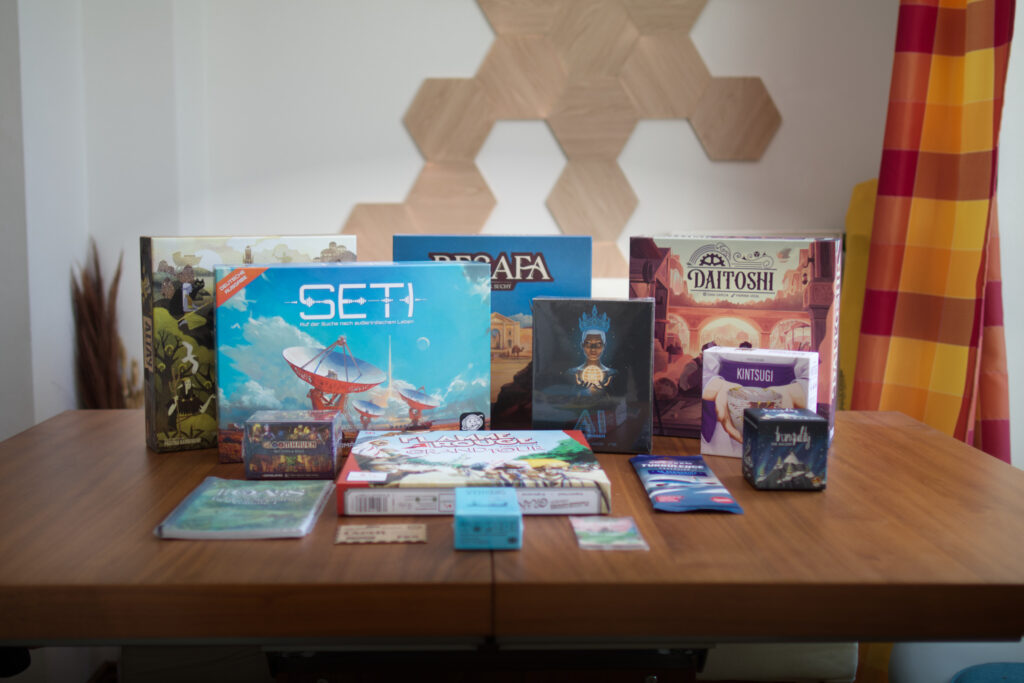
Late Additions
There had been a few more games I had been curious about but didn’t want to pick up at Essen or simply were sold out before I got around to demo them. The Tea Garden promo actually allowed me to order it online at a nice discount and the game arrived 2-3 weeks after Essen, Galileo Galilei I found for it’s regular price on the second hand market, and Stamp Swap I got below retail second hand as well because apparently someone had picked up a copy at the fair but decided it wasn’t for them.
To make things worse, I had been searching for a couple of older games for a while and scored good deals on the second hand market just before Essen happened, so the inflow of new-to-me games was even bigger … uncomfortably big to be honest. I use a mechanism for new games I like to call my “couch of curiosity”: I don’t have a shelf of shame/opportunity where games can be neatly stacked away until a decision is made on whether to keep or re-sell. Instead, I keep them in the open and sort of “in the way”. Whenever friends come around, I move them off somewhere else to have things neat and tidy but move them back when they are gone. It’s annoying, but that’s kind of the point. If there’s something on the couch, it’s a good visual reminder for me to not buy more new games and make a conscious decision if the game really needs to become part of the collection.
In this case, the “old game” competition for the new Essen releases contained some true heavy weights: Splotter’s Food Chain Magnate, Age of Steam Deluxe, Vital Lacerda’s Escape Plan, and Mark Herman’s Peloponnesian War. Shelf space is limited, my collection already well stocked, and I needed to reclaim my couch by making some tough decisions. The game was on!
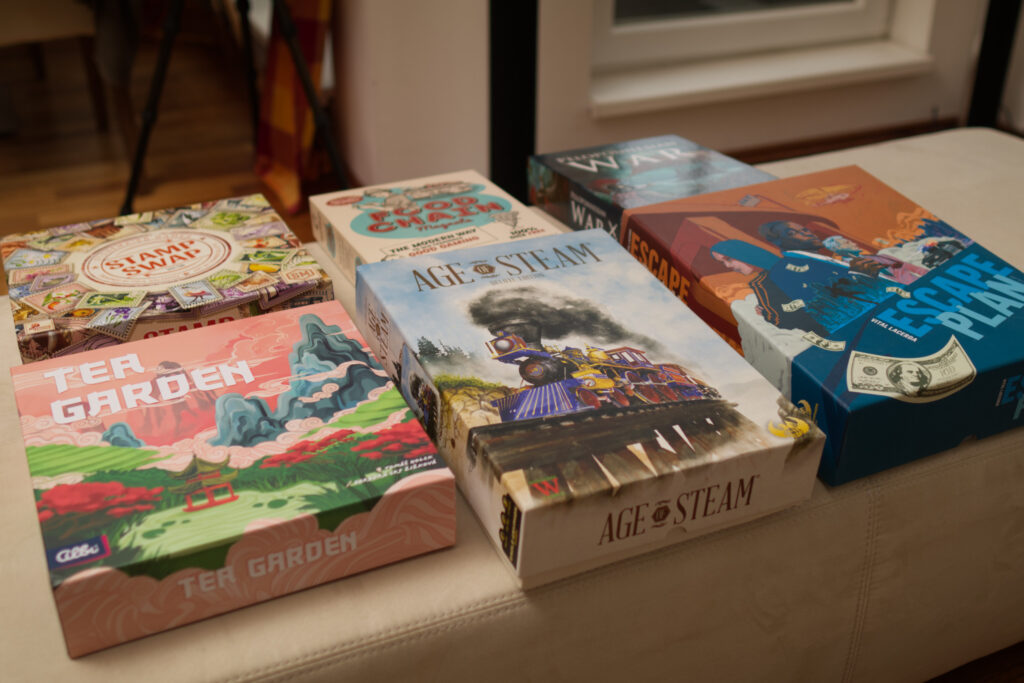
Those That Have Already Passed On
Let’s start with what most people are talking about and what has good chances of becoming game of the year for 2024: SETI. I had mostly picked it up because I knew a friend of mine would really, really enjoy it and it turned out just so. I also played it a few more times solo but then decided to sell it while people are still looking for copies. It kind of feels like an Ark Nova moment for me: it’s a great game and I get why so many are loving it, but it’s just not for me. I like the theme, I love the rotating space mechanism. On the other hand, the card play and aliens just weren’t my cup of tea. I had one session that was particularly frustrating because I had multiple situations back to back where I built up to something over a number of rounds and then one of the other players would sneak in and destroy it just because they were in front of me in turn order. I usually like tight economies, but this was the first in a long time where it just left me frustrated. Again to stress: I’m likely the odd one out here. SETI is a great game and there is a reason why so many enjoy it. Very well designed modern Euro.
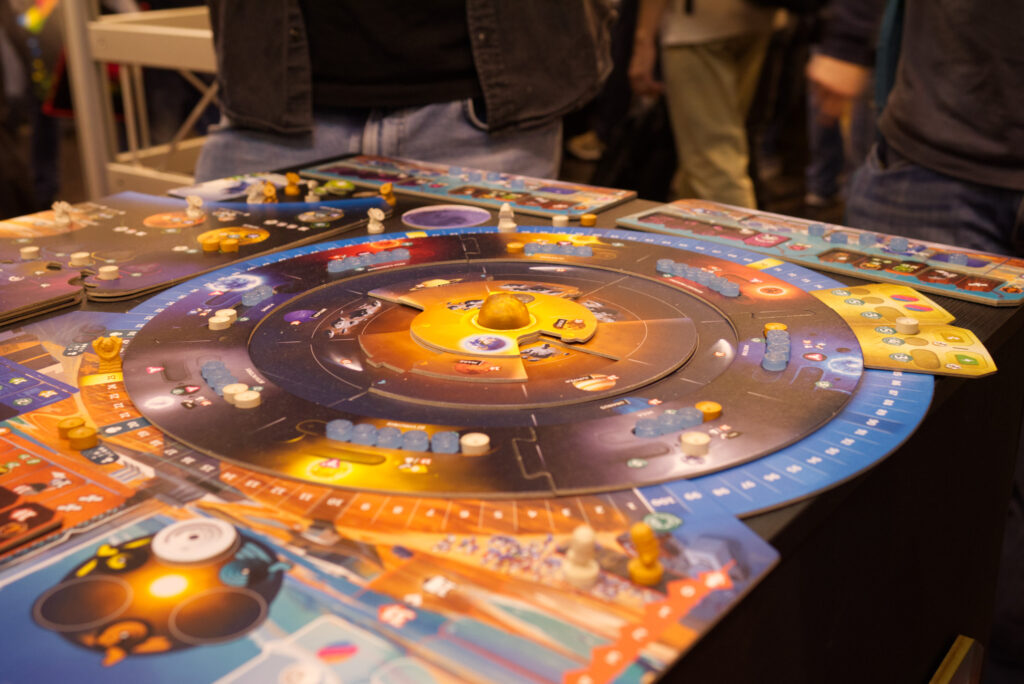
Altay: Dawn of Civilization was another game that I only picked up out of curiosity (and to potentially write about it) but was pretty sure wouldn’t be for me in the long term. It’s a sort-of-civ-like deck building game where players spread over the map, bash heads, and try to complete technology to end up with the most VP at the end of the game. This plays surprisingly quickly. Depending on which of the asymmetric factions you play, bashing out all the settlements (which is the end game trigger) can be over in ten rounds or less.
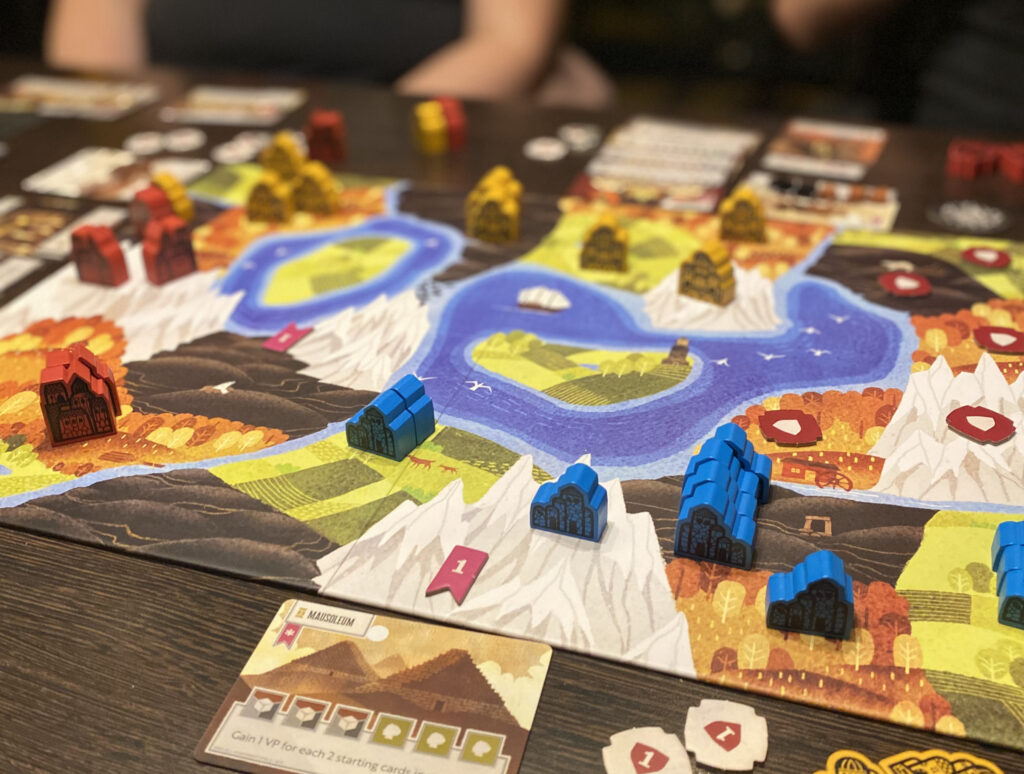
In concept, this could be an amazing game where you race through your deck, refine it with new purchases, and use it to get dominance on the map. What holds it back is that there isn’t that much variety in the deck building and the play on the map doesn’t feel satisfying enough. It almost feels like a filler game: by your third game, most turns you are in auto-mode because you’ll know exactly what to do with your cards and there isn’t really any tactical or strategic decision to make. So interesting, but not enough for me to get it to the table again.
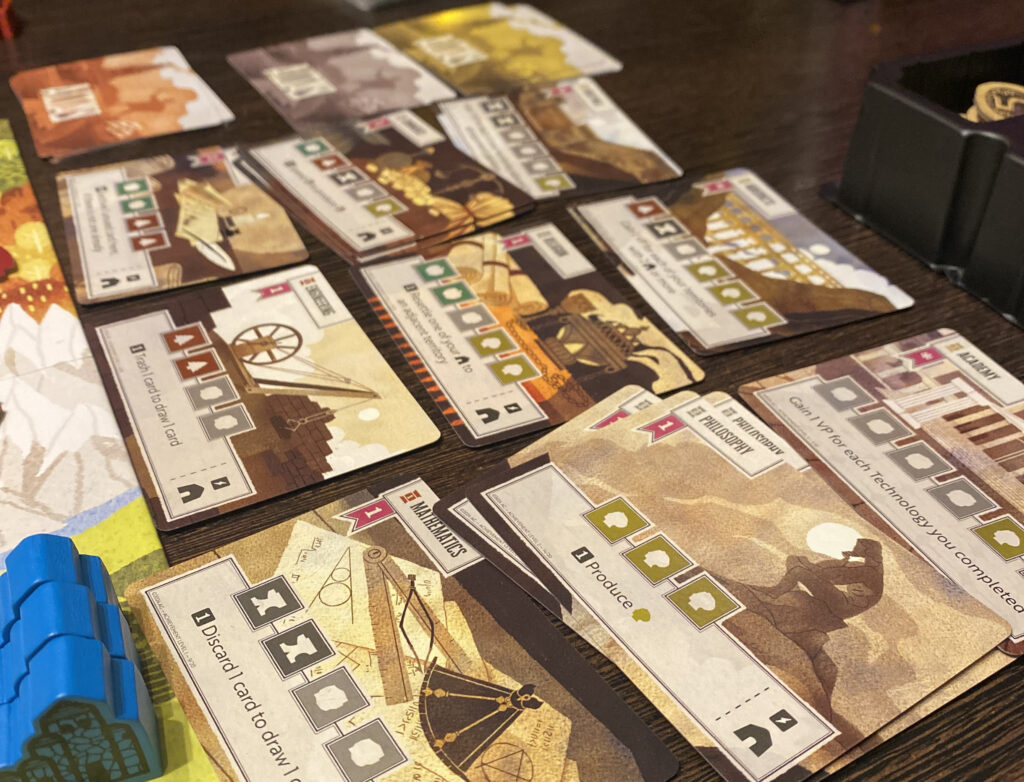
In a similar vein, Resafa had been a game I would have just demoed at Essen if I would have had more time. But with all the interviews and blogging I did, I had to make some hard decisions what to demo and what to just buy blind. I wasn’t sure if it would really be for me because my playgroup and me really enjoy Vladimir’s heavier games (Evacuation, Underwater Cities, Woodcraft, …) and this set out to be more in the mid-weight range. I haven’t played it enough to give you any real insights on it. It’s more a case of played it once, didn’t grab me, and there was someone else who was happy to get my copy, so I sold it to her.
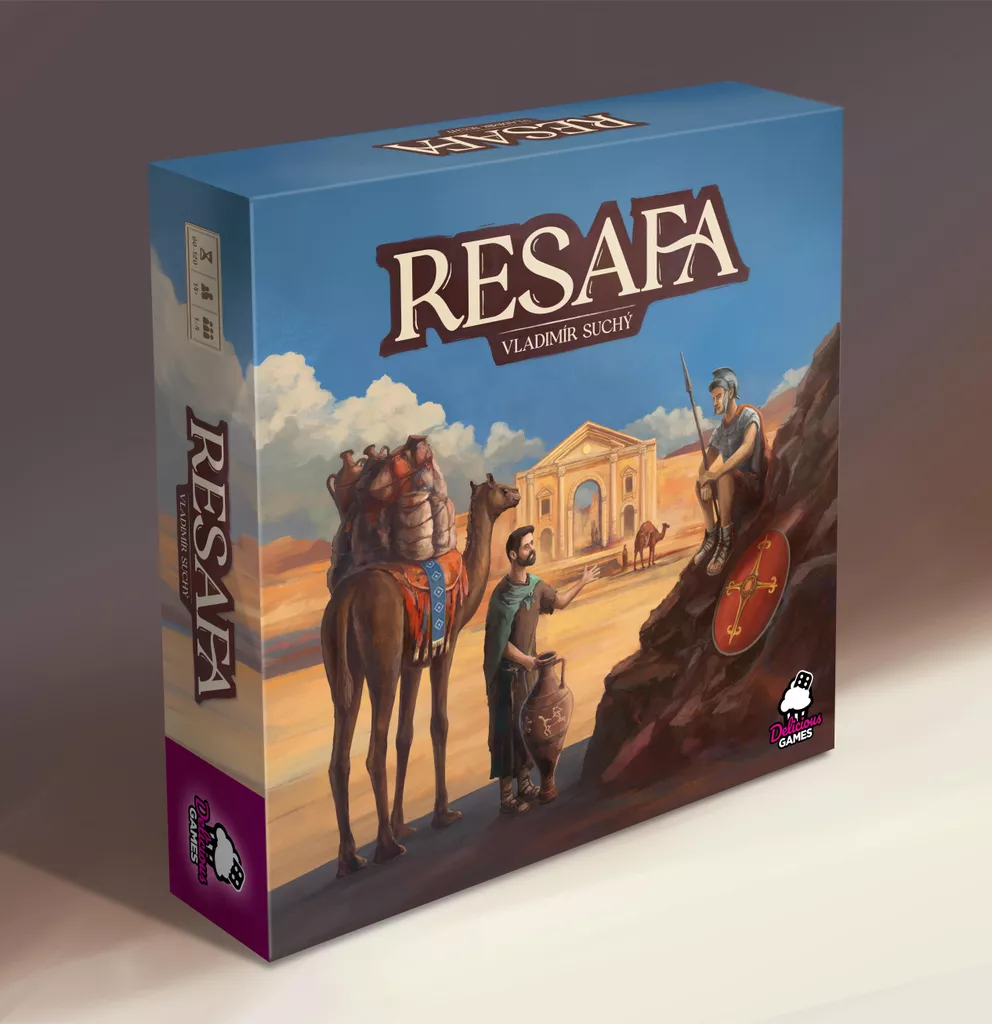
I did in fact demo AI 100% Human while I was at Essen and wasn’t particularly stoked about it, especially for its hefty price of 50€! Yet, I still picked up a copy with the intent to write about it. Due to some scheduling issues and life getting in the way, I unfortunately wasn’t able to play it again. But with all the other games lined up that way more excited me, it was another case of passing it on to someone else that would be happier with it than me.
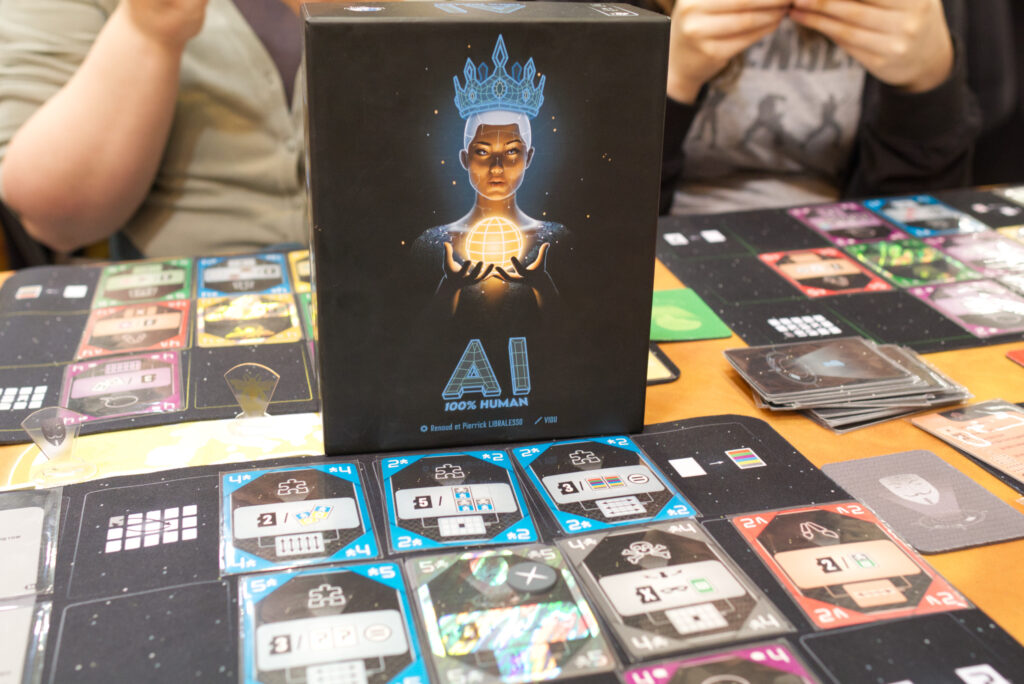
The lesson here is once again: go with your gut. If you’re not totally stoked about a game, no need to buy it at the fair as there will always be ways to pick it up later. What I didn’t account for was how many interviews I would be doing at Essen and how much fun it would be to edit those. A lot of my post-Essen game time was spent on doing that instead of gaming and so for next year I’ll know to buy even less games for potential reviews.
I also managed to play Kintsugi. I haven’t been able to sell it yet but I’ve made the decision that I don’t need it. I love the theme and illustrations, they are just stunning. The gameplay isn’t bad either. Players are drafting porcelain pieces and trying to make sure the leftover pieces of each round cause the right things in their collection to break because repairing broken pieces with gold makes them more valuable. Each type of card (pot, dish, …) has a different scoring criteria on it which make things a little bit more interesting, but in the end it’s a simple drafting game with no big “ah ha” moment unfortunately. So cute, but not something that I would actively seek out except for the theme.

Souvenirs from Venice also won’t make the cut but will be hard to sell since small games in general have less interest in the second hand market. It’s much easier to sell off a 50-100€ box than a 10-20€ one. The idea of rushing through Venice to collect souvenirs is super charming, but the gameplay doesn’t have that many challenges for non-casual players. When it’s your turn, you reveal one piece, then roll a die to move your gondola and then be able to buy or sell a piece where you are standing. The goal is to get sets of threes before time runs out and head back to the airport. I think there’s something in there. If for example players could have gone back to the airport early to force the game to be over quicker, that would have been a nice twist. As is, it’s a bit chaotic and cute, but not much more in my opinion.
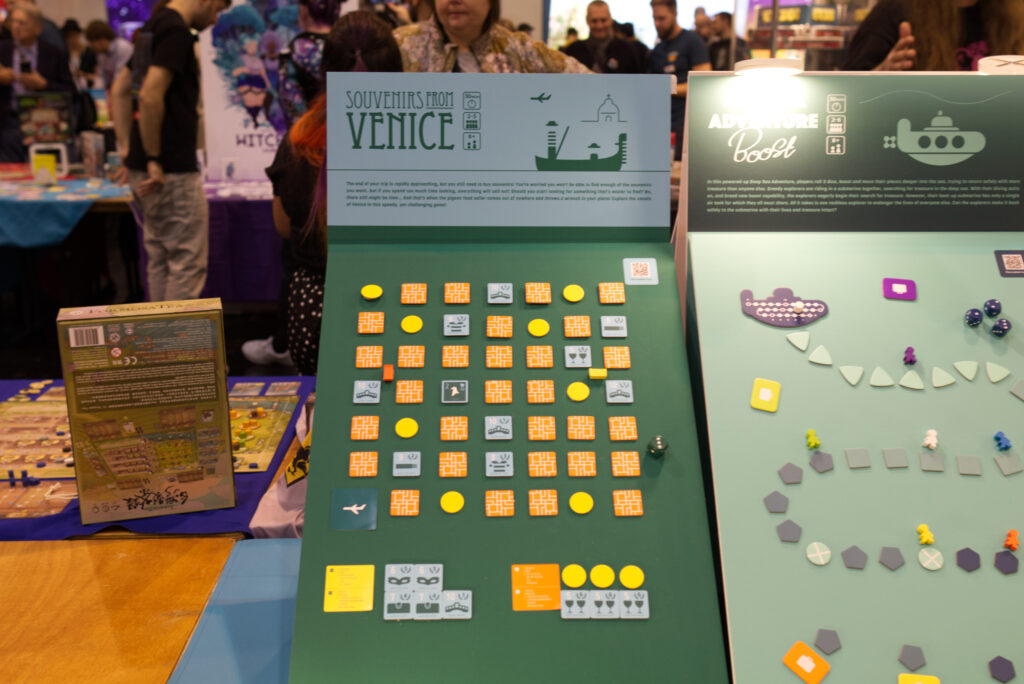
The Hits
Biggest hit of the fair so far is still Kingdom Legacy, the tiny 140 card solo-only legacy game. I’ve already written about it so you can read more about it in the review. I already snatched up a second copy for a friend, played mine multiple times through and got two other friends hooked as well 😀. In Kingdom Legacy, you’re cycling through an ever growing deck, manly discarding cards to produce resources and use those to upgrade other cards so they return in a stronger / different version next time you cycle through your deck. It has a slight Palm Island vibe but turned up to eleven and there is some lovely pseudo-narrative emerging. It’s not that there is a story, but it’s fun to see how upgrading a particular landscape will help you gain a new character that then can discover new lands for your kingdom and so on. If you play solo at all, just get it. Great 3-4h gaming experience and if you work around the stickers, easily fun for 4-5 playthroughs. Super excited about the new big (100+ cards) expansion that has been teased, can’t wait!
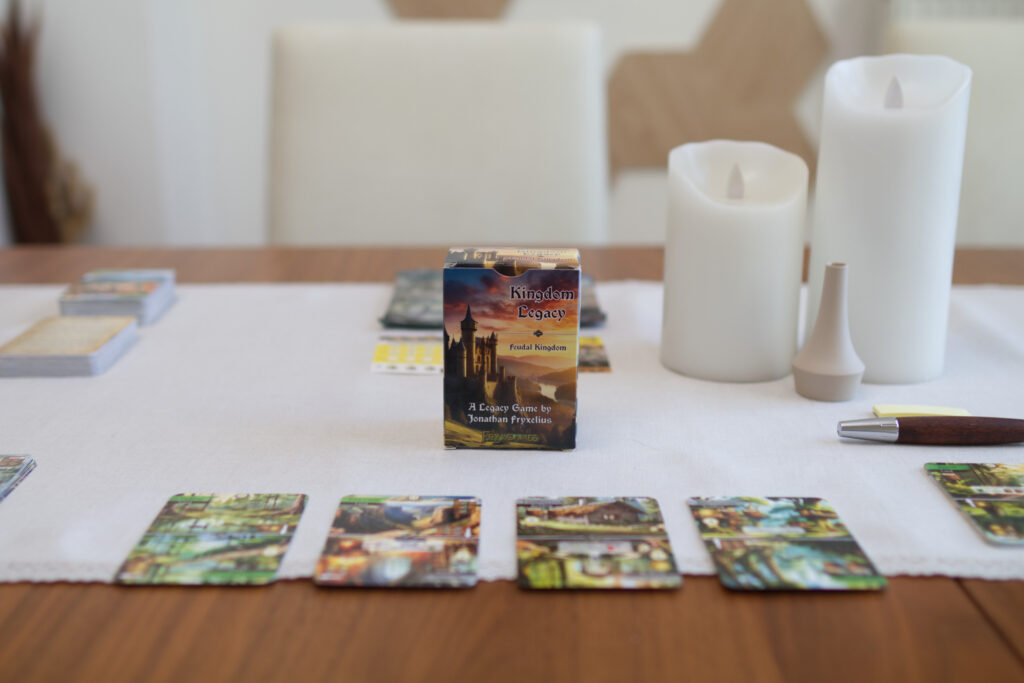
Galileo Galilei is one of the other Essen hits for me. I’m just about to finish up my full review but without spoiling much, it’s a very competent and polished modern Euro. There is nothing that would make me say “you absolutely have to have this” but there is so much done right in the way the design works and the production was executed that it’s just a pleasant gaming experience, a good game to have, and one I’m always happy to play. So, more on Galileo Galilei in a few days.
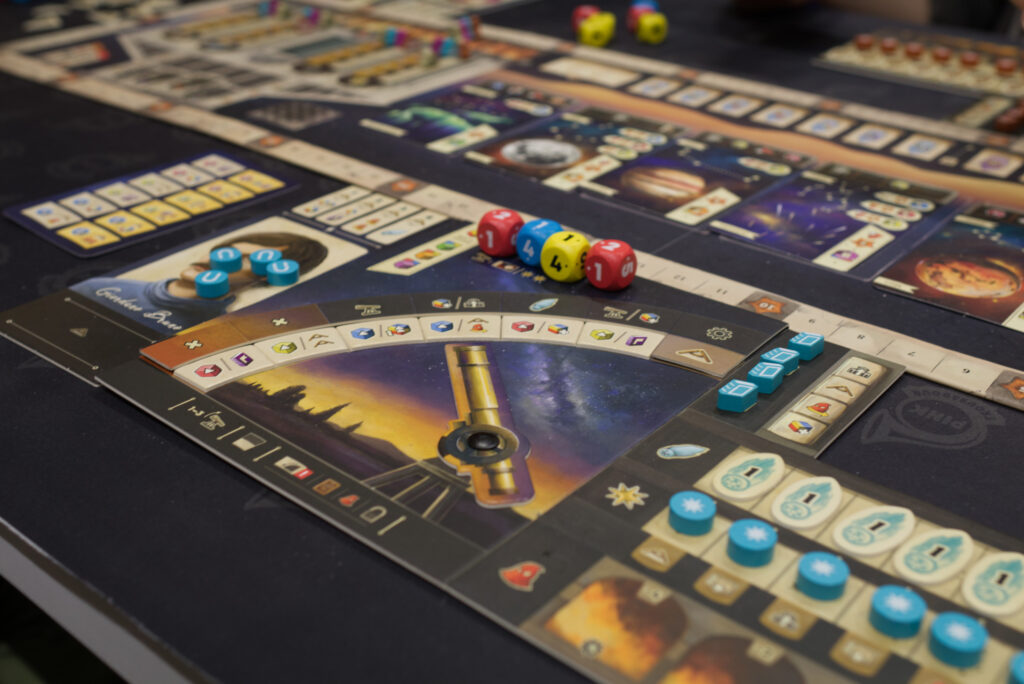
I would describe Landmarks as a Codenames-like treasure hunt, but one that has less barrier for entry. At least in all sessions of Codename I played, the clue giver was always struggling to come up with great clues and even when they had one, still searched for an even better one. This could either lead to long stalls or someone being frustrated as they were uttering “there must be something better I can do”. Landmarks on the other hand works much simpler: there are already words on a map (e.g. elevator, chocolate, pump) and the clue giver has to come up with a single word that by association should indicate the remaining players where it needs to be located. Is washing machine closer to pump or chocolate? Or somewhere in between? …

I’ve played it a few times by now, mostly 2p, and even the easy level is already quite tricky to do without leading the other player into traps or curses. The goal is to ideally find three treasures before then discovering the exit hex, but the limitations of the game make it quite crunchy. My favourite aspect is that the clue giver has a limited amount of blank hexes representing the water bottle of the expedition. From time to time, you have to take a detour just to fill the stack back up, and so on. Great production with a lovely cloth map, super happy with it even if we still fail to get the other players to do a precise 60 degree turn when needed. I already liked Kites and Sky Rockets from Floodgate Games, but I would say this is their best one so far. It just seems damn hard to win!
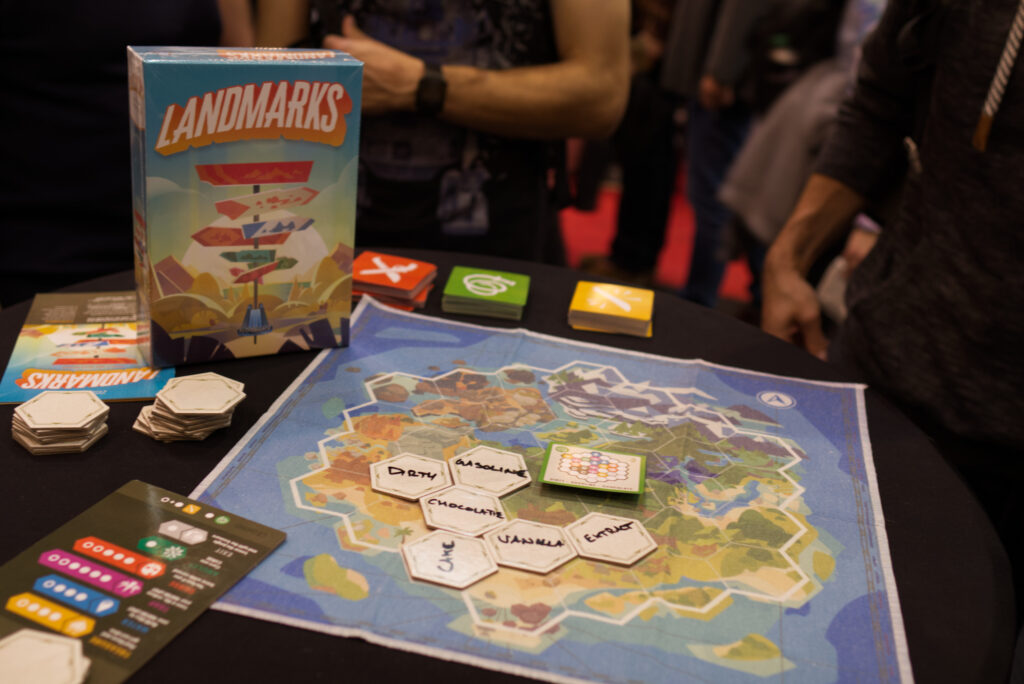
Bit of a delayed surprise for me is Stamp Swap. It’s a very simple I-cut-you-choose game with some serious usability issues (categories of tiles hard to distinguish, gold foil in some light makes point values unreadable, some symbols ambiguous, etc). I demoed it at Essen and all at the table felt disappointed, not what we had hoped for or expected. I still picked up a copy after Essen because I was curious how the heck a solo mode for this would work and to my surprise the answer is: quite well!
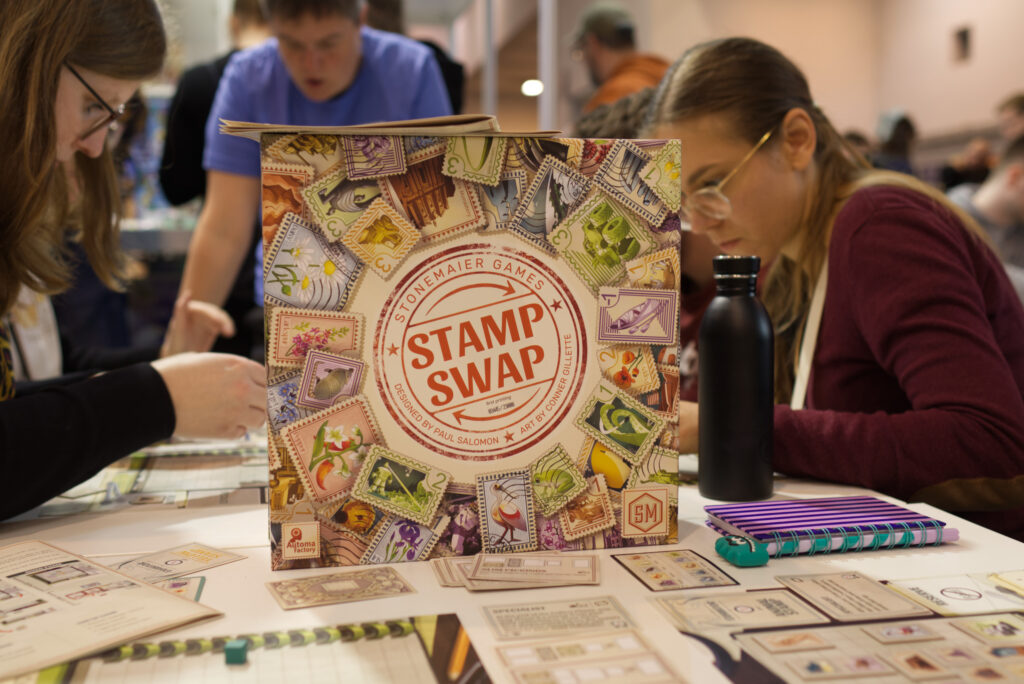
Stamp Swap basically has three rounds of I-cut-you-choose with some special powers and scoring mechanisms thrown in to spice things up at least a little bit. The spatial puzzle is way less relevant than one might think and more of a side game. Overall, it’s a very light game in a gorgeous production that is over way too quickly for my taste. But then, its retail price is just 35€. My current guess is it’s suffering from the framing a lot of gamers will apply due to the box size that this is a mid weight substantial game when it should rather be seen like a light filler. I’m still trying to figure this one out, will probably write a full review about it at some point. Right now what’s keeping it on my couch of curiosity (and thus from being sold off already) is that solo mode. I don’t think I have anyone in my life that’s interested in this type of super light game, so my assumption is there might be a chance I’ll be keeping it just for solo and the great art. After all, for that price, it’s hard to complain if it’s not the best game in the world. But the jury is still out. It all depends on how often I will see myself actually getting this off the shelf in the next months/years. Overall though, I like it more than I had initially thought.
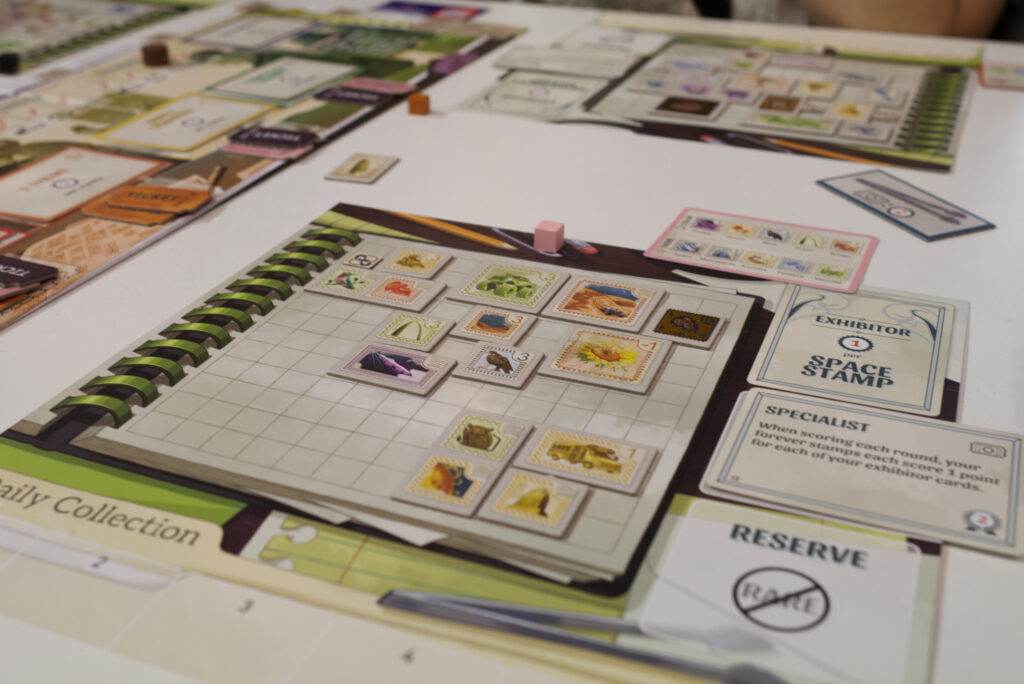
Not an Essen release, but Tokyo Highway Rainbow City has arrived and I was surprised how much fun I already had with it. This is mostly due to the great solo mode, another game that surprised me that it would be playable solo at all. Compared to the original version, Tokyo Highway has become a bit less of a dexterity game and more of a somewhat strategical game, although most of the fun is still building absurd constructions. This is mostly due to non-slip pads underneath the streets and replacing the wooden cars with rubberised versions. Everything is just a little bit more stable now and the new mission mode adds ways to get more points than just placing your cars. Really happy with it so far. Just note: the solo mode unfortunately is an optional add-on!
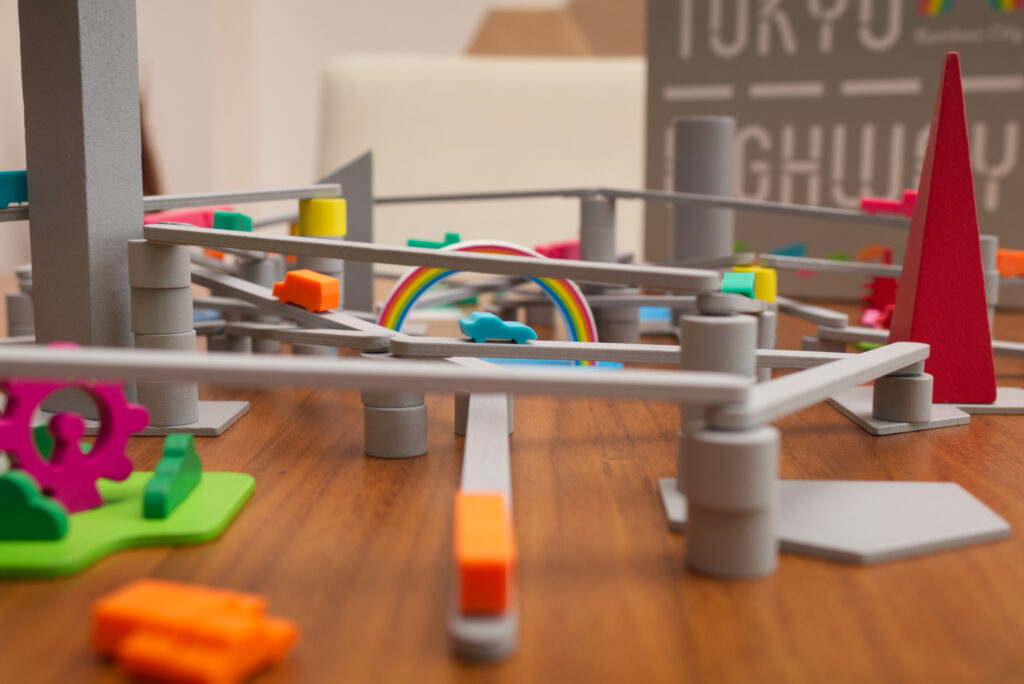
The Ones I’m Still Excited For
The game from Essen I would most love to play right now is World Order, the follow-up game from the people that brought us Hegemony. I buy all the games I review and so the thought of asking if I could have a preview copy hadn’t even occurred to me … but now I kind of wished I would have. That limited demo play at Essen definitely has me interested and I know my playgroup would love it! It’s a totally different game from Hegemony and I think I’ll be missing the almost role playing like aspects of Hegemony, but World Order seems to be more of a gamers game, where the rules get out of the way quicker and then the deck building and area majorities take over. I’m particular curious to explore all the depths of the theme integration because here it had to be done way more subtle than in Hegemony where each player had their own rules and cards. Definitely a game to watch! Kickstarter will launch soon and they have my money.
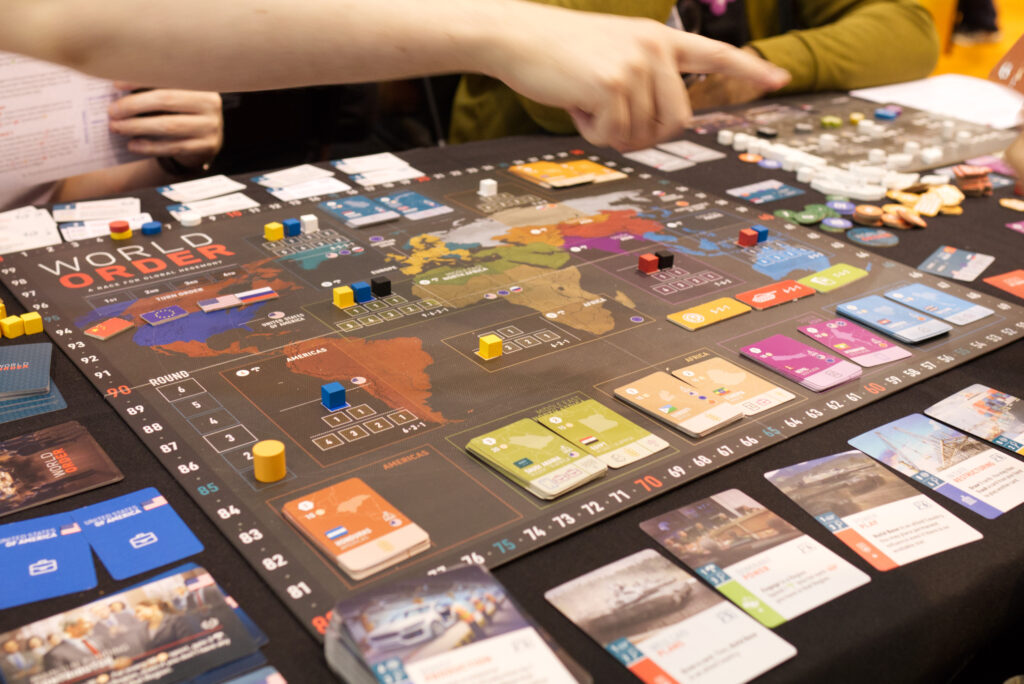
I have taken three attempts already at trying to learn Daitoshi. There is something in the way the rules are written that make me set the game up, try to get into it, and halfway through it I’m lost and wondering what I’m supposed to do. Not sure if it’s the rules or I’m just not in the mood for 30 pages of rules right now. I should probably just watch a rules teach and push through it because I have the feeling I will like the actual gameplay a lot!
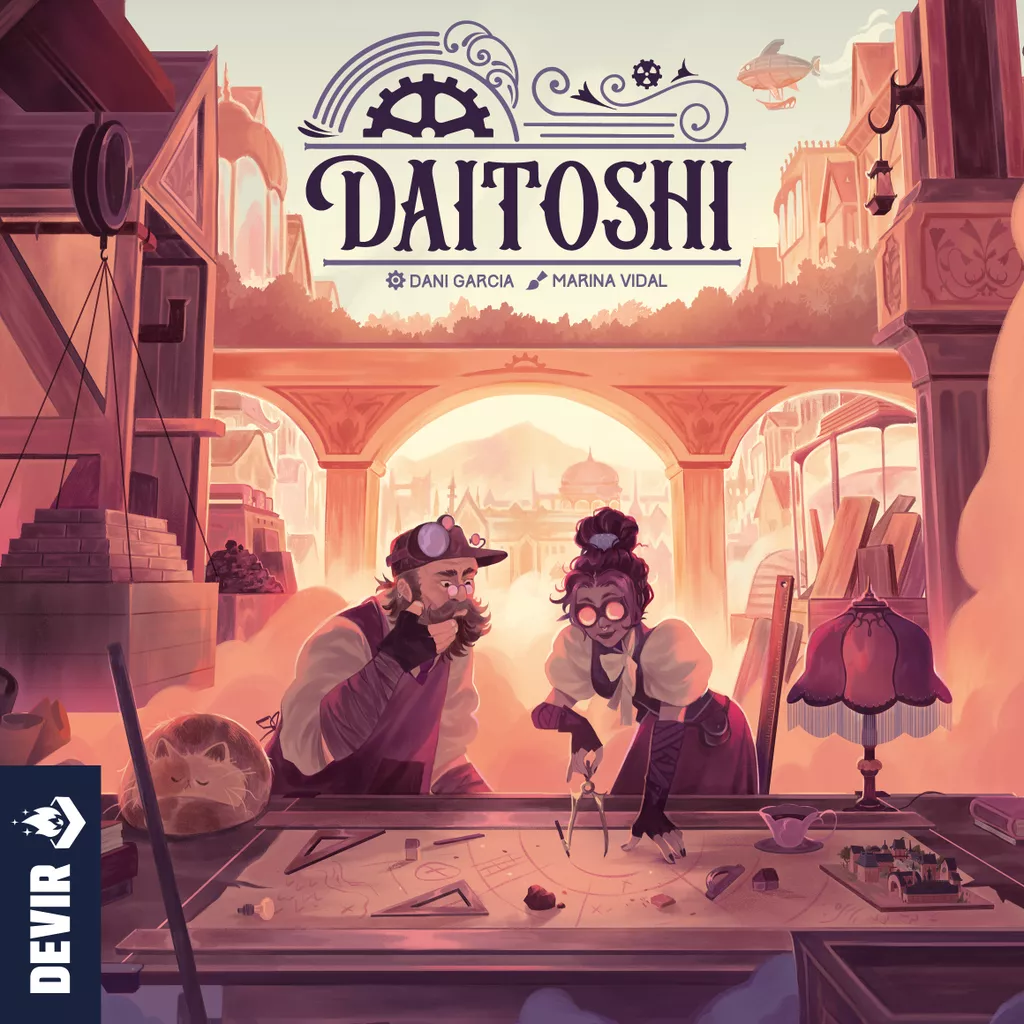
I also desperately want to start digging into the Roads & Boats Scenario book but I first want to clear out my couch of curiosity. This small book will likely be more like a marathon, something that will take many, many sessions to explore. One thing I want to do soon though is finish up editing my interview with Joshua, the creator of this lovely little gem.
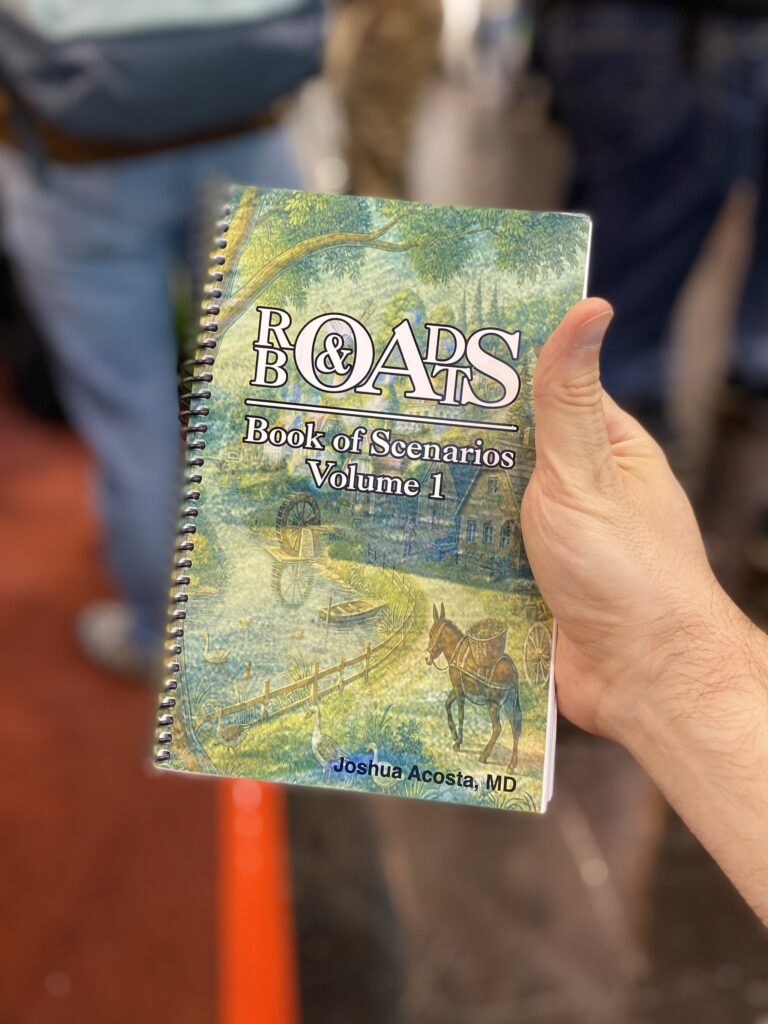
Summing It Up
The moral of the story here is: you don’t need to buy many games at Essen. So far, about 50% have already left my collection again without me even being interested in investing the substantial time required to write a full review for them. Those I really liked will be available in retail before Christmas, so you’ll just need to wait a couple more weeks or pay a small premium on the second hand market. I can’t even fathom what the keep-or-cull quote is for reviewers that brought back suitcases and suitcases full of games. Maybe they just play way more than me or have more shelf space for games that will rarely come to the table?
What I definitely notice is how hard the competition has become for any new game. Just sitting here right now, I see like a dozen games on my shelf I would really like to play this very moment: John Company 2nd Edition, Dune Imperium, Rise & Fall, Antiquity, Indonesia, Heat, Pipeline, Grand Austria Hotel, Hegemony, Maglev Metro, Castles of Mad King Ludwig, … Having those at hand makes it challenging especially for games with many rules to actually get played. I kind of hope after a phase of Kickstarter extravaganzas and 20+ pages of rules, we’ll be getting back to more “system design”, games that have like 10 pages of rules but feel infinitely repayable. Having played Age of Steam for the first time just yesterday also strengthened this appreciations for games that are easy to learn but hard to master. It also again made we wish I had picked up a retail edition of Steam Power because it will still be some time before my Deluxe Edition of it will fulfil.
What games do have you truly excited right now? Is it a new release or an old classic? Let me know in the comments.
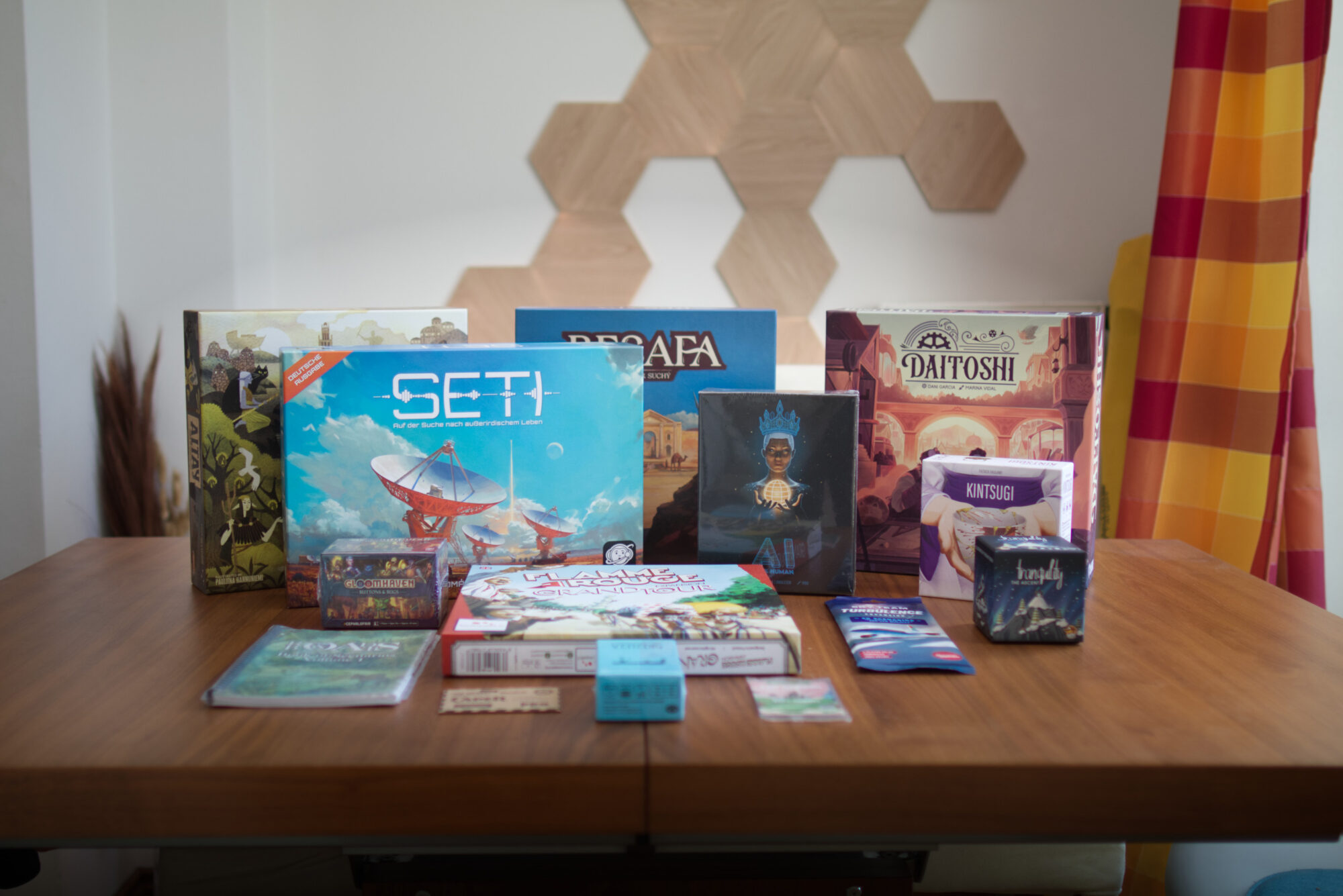
Hallo Alex,
danke für diesen schönen und ausführlichen Messe-/Spielebericht 😊! Ich lese gern Berichte über Spiele und bin damit bei Dir hier genau richtig.
Was ein wenig ungewöhnlich ist, dass Du die Leser Deines Berichts mit „Sie“ anredest. In Spielerkreisen ist es üblich, sich zu duzen. Das macht es etwas persönlicher.
Zu „Daitoshi“: ich habe es nicht selbst gespielt oder auch nur die Regel gelesen, habe aber schon von mehreren Spielern/YouTubern gehört, dass diese Regel furchtbar sein soll….
Viele Grüße
Gabi
PS. Dein Blog wird unter meinen Lesezeichen gespeichert 😊!
Danke für’s Lob!
Ich nehme an du meinst, dass ich meist “one” statt “you” verwende? Das ist tatsächlich Absicht und hat nichts mit Siezen zu tun sondern eher mit “man” statt “du”. “You” hat im englischen immer die Doppeldeutigkeit, ob man den Leser direkt ansprechen will oder mehr im allgemeinen, z.B. “you can …” hat sowohl Konnotationen von “du darfst”, “ich erlaubt dir”, “man kann”, und vielem mehr. One ist nicht weniger persönlich, macht aber klar es geht um jemand im ganz Allgemeinen a la “man kann das und das machen”. Ganz am Anfang hab ich oft “you” verwendet und für mich kam der eher ein vorschreibender Vibe von “so hast du’s zu spielen” rüber als “so kann man’s machen”. Mir ist es wichtig die Texte immer als Einladung zum eigene Meinung bilden und Mitdiskutieren zu verstehen, daher diese bewusste Wahl.